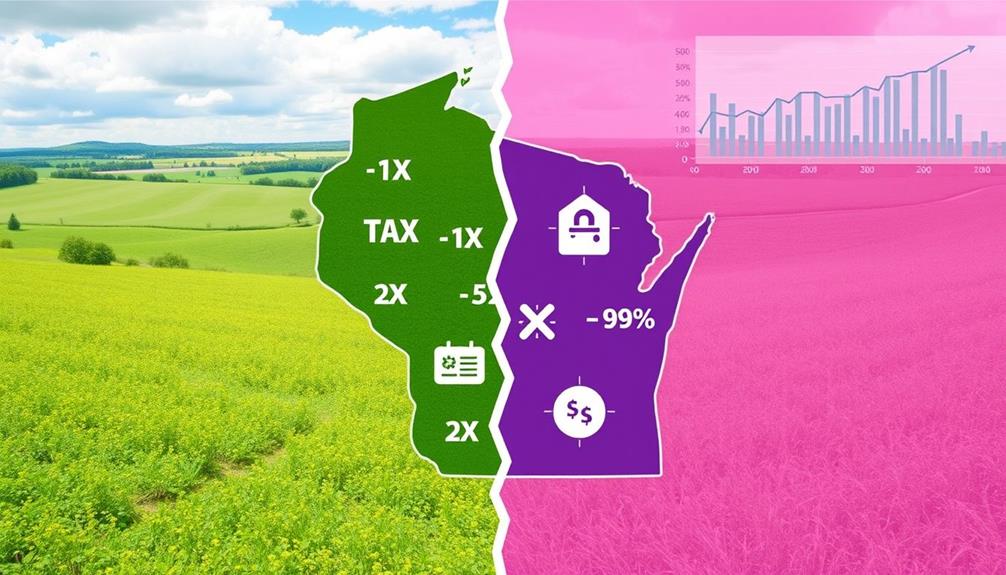When taking out money from an IRA in Wisconsin, it’s important to note that there are state taxes to consider, ranging from 3.50% to 7.65%, as these withdrawals are viewed as regular income. If you’re 65 or older, you can deduct up to $5,000 from your taxable income. Nonresidents do not have to pay state taxes on IRA withdrawals, which can help lower your overall tax burden. Understanding how your residency status affects your tax responsibilities is crucial. Exploring all possible exemptions and deductions could improve your tax planning and financial security. There is more to learn about effectively managing your retirement income.
Key Takeaways
- Wisconsin taxes traditional IRA withdrawals as ordinary income, with rates ranging from 3.50% to 7.65% based on income brackets.
- Seniors aged 65 and older can subtract up to $5,000 from taxable income for qualified IRA withdrawals.
- Social Security benefits are exempt from Wisconsin state taxation, providing additional tax relief for retirees.
- Nonresidents are exempt from state income tax on IRA withdrawals, while part-year residents are taxed only on in-state withdrawals.
- Estimated tax payments are required if you expect to owe $500 or more in state income tax after withholding and credits.
Wisconsin Tax Overview

When you withdraw funds from your IRA in Wisconsin, it's essential to understand how state taxes will impact your finances. Wisconsin imposes state income tax on IRA withdrawals, which can range from 3.50% to 7.65%, depending on your income bracket.
Unlike Social Security benefits, which are exempt from Wisconsin state taxation, all traditional IRA and 401(k) withdrawals are considered taxable income.
If you're 65 or older, you can take advantage of a retirement income exclusion that allows you to subtract up to $5,000 from your taxable income for qualified IRA withdrawals. This can provide some relief, but keep in mind that local taxes may also apply, further affecting your overall tax burden.
Given the complexities of state tax laws and potential local taxes, it's advisable to consult a tax professional. They can help you navigate your specific situation, ensuring you maximize any exclusions or deductions available to you.
Understanding these tax implications can help you make informed decisions about your retirement funds and protect your financial well-being.
Taxation of IRA Withdrawals

Understanding the taxation of IRA withdrawals is essential for effective retirement planning. In Wisconsin, withdrawals from traditional IRAs are fully taxable as ordinary income, which means they're subject to state income taxes.
Additionally, considering an IRA rollover to Gold might provide some tax advantages and diversification benefits in the volatile economy. Here are four key points you should know:
- Tax Rates: Wisconsin taxes IRA withdrawals at rates ranging from 3.50% to 7.65%, depending on your income bracket.
- Retirement Income Taxable: Unlike Social Security benefits, all IRA distributions are taxable, directly affecting your retirement income planning.
- Age Consideration: If you're 65 or older, you can subtract up to $5,000 from your qualifying retirement plan or IRA income, which may help lower your taxable income.
- Estimated Payments: Be aware that if your balance due is $500 or more, you might need to make estimated tax payments on your IRA withdrawals to avoid penalties.
Understanding these elements of the taxation of IRA withdrawals can help you manage your finances better during retirement.
Make sure to plan accordingly to navigate Wisconsin taxes effectively and minimize your state income tax liability.
Social Security Benefits in Wisconsin

Wisconsin retirees can benefit greatly from the state's tax policy regarding Social Security benefits, which are exempt from state taxation. This exemption provides significant financial relief for those relying on Social Security as a primary source of retirement income. However, it is important to understand that your benefits may become partially taxable based on other income sources, with up to 85% at risk of state taxation.
Income thresholds play a significant role in determining your tax liability. If your total income exceeds certain limits, you might face unexpected tax burdens. Thankfully, Wisconsin also offers tax credits for low-income retirees, enhancing the overall financial support available to those who qualify.
Here's a quick overview of how these factors interact:
| Factor | Description | Impact on Retirees |
|---|---|---|
| Social Security Benefits | Exempt from state taxation | Reduces overall tax liability |
| Income Thresholds | Dictates potential taxation on benefits | Higher income could lead to tax on benefits |
| Tax Credits | Available for low-income retirees | Provides additional financial relief |
Understanding these elements can help you navigate your retirement income more effectively in Wisconsin.
Pension and Annuity Taxation

When it comes to pension and annuity taxation in Wisconsin, understanding the tax rates is essential for your financial planning.
You'll want to explore various withdrawal strategies to minimize your tax liabilities, especially since exemptions and deductions may apply based on your circumstances.
Take the time to review these elements to guarantee you're making informed decisions about your retirement income.
Tax Rates Overview
In Wisconsin, retirees face a range of tax implications on their pension and annuity income, with tax rates for IRA and 401(k) withdrawals spanning from 3.50% to 7.65% based on your total income bracket. Understanding these tax rates is essential for effective retirement planning.
Here are some key points to take into account:
- State Income Tax: Pensions are fully taxable as ordinary income, just like IRA distributions and 401(k) withdrawals.
- Tax Rate Ranges: Your state income tax rate on withdrawals will depend on your total income, impacting how much you keep in retirement.
- Government Pensions: Certain government pensions may qualify for tax exemptions, unlike private employer pensions, which are fully taxed.
- Age Benefits: If you're 65 or older, you can subtract up to $5,000 from your taxable income for qualified retirement plan or IRA income, given you meet specific income limits.
Withdrawal Strategies
Maneuvering withdrawal strategies for pensions and annuities can considerably impact your overall tax liability in retirement. In Wisconsin, pension income is fully taxable as ordinary income, while withdrawals from retirement accounts like IRAs and 401(k)s are subject to state income tax rates ranging from 3.50% to 7.65%.
By strategically timing your withdrawals, you can influence which tax bracket you fall into, potentially reducing your taxable income.
If you're aged 65 or older, you can subtract up to $5,000 of qualified retirement plan or IRA income from your taxable income, provided your adjusted gross income meets certain thresholds. This tax relief can be invaluable in managing your overall tax burden.
Additionally, some government pensions may be exempt from state taxes under specific conditions, offering further opportunities for tax savings.
It's important to evaluate your unique financial situation and consider how different withdrawal amounts and timings can affect your state income tax rates. Consulting with a tax professional can help you develop a personalized withdrawal strategy that minimizes tax impacts while maximizing any benefits available to you.
Exemptions and Deductions
Maneuvering the landscape of exemptions and deductions for pension and annuity taxation in Wisconsin can considerably reduce your tax burden. Understanding these financial advantages is essential for maximizing your retirement income. Here are some key points to reflect on:
- Qualified Retirement Plan Exemption: If you're 65 or older, you can subtract up to $5,000 of qualified retirement plan or IRA income from your taxable income, depending on your adjusted gross income (AGI).
- Military Benefits: Retirement benefits from military and uniformed services are completely exempt from Wisconsin income tax, offering substantial savings for eligible retirees.
- Older Retirement System Payments: If you retired before January 1, 1964, some retirement system payments may be exempt from state income tax, depending on specific local and federal systems.
- Personal Exemptions: Taxpayers aged 65 and older can claim a $700 personal exemption, plus an additional $250 for each spouse if both are 65 or older when filing jointly.
Exemptions for Seniors

Seniors in Wisconsin can take advantage of several tax exemptions that greatly reduce their taxable income. If you're 65 or older, you can subtract up to $5,000 of your qualified retirement plan or IRA income from your taxable income. This can greatly lower your overall tax liability, especially if your adjusted gross income (AGI) is below specific limits: $15,000 for single or head of household filers, and $30,000 for married couples filing jointly.
In addition to these exemptions for seniors, you can also claim a $700 personal exemption. If both you and your spouse are 65 or older and filing jointly, you can add an extra $250 exemption for each of you. This further reduces your taxable income.
Moreover, if you're receiving military retirement benefits, those are completely exempt from Wisconsin state income tax.
Tax Benefits for Retirees

Wisconsin provides a range of tax benefits specifically designed for retirees, enhancing their financial stability during retirement.
If you're a retiree, you can take advantage of several key provisions that lessen your personal income tax burden:
- Subtraction for Retirement Income: You may qualify for a subtraction of up to $5,000 on your qualified retirement plan or IRA income, reducing your taxable income considerably.
- Personal Exemptions: Retirees aged 65 and older receive a $700 personal exemption, and if you're filing jointly with a spouse who's also 65 or older, you can claim an additional $250 exemption for each of you.
- Property Tax Credits: Eligible seniors can benefit from property tax credits, such as the Homestead credit, which can considerably lower property tax liabilities for low-income homeowners aged 65 and older.
- Exemption on Military Retirement Benefits: Certain retirement income types, including military retirement benefits, are exempt from Wisconsin income tax, providing additional financial relief.
These tax benefits are designed to support your retirement lifestyle, making Wisconsin an appealing place to enjoy your golden years.
Residency and Tax Implications

When it comes to your retirement income, understanding residency rules can greatly impact your tax obligations. In Wisconsin, if you're a full-year resident, you'll face state income tax on your IRA withdrawals, with rates ranging from 3.50% to 7.65% depending on your income bracket. This means residency is a vital factor in determining your tax liability.
If you're a nonresident, you won't pay state income tax on your IRA withdrawals, which can greatly reduce your overall tax burden. For part-year residents, you'll only be taxed on IRA withdrawals for the duration of your residency in Wisconsin; income earned outside the state remains nontaxable.
It's also important to note that Social Security benefits are exempt from Wisconsin state taxation. This can further influence your overall tax obligations if you rely on multiple income sources in retirement.
Establishing legal residency involves showing that you have a permanent home in Wisconsin intended for indefinite return, which directly impacts how your retirement income is taxed. Understanding these nuances will help you make informed decisions about your finances in retirement.
Estimated Tax Payment Requirements

When you're withdrawing from your IRA, it's essential to understand Wisconsin's estimated tax payment requirements.
If you expect to owe $500 or more in state income tax after factoring in your withholding and credits, you'll need to make estimated payments.
This obligation applies to your non-wage income, so keep an eye on how your withdrawals impact your overall tax situation.
Estimated Payment Thresholds
In states like Wisconsin, you need to be aware of estimated payment thresholds to avoid underpayment penalties. If your total tax liability after deductions and credits is $500 or more, you're required to make estimated tax payments.
Here's what you should know:
- Quarterly Payments: Estimated payments must be made quarterly, with deadlines on April 15, June 15, September 15, and January 15 of the following year.
- Calculating Payments: Use Form 1-ES to calculate your estimated tax payments, which provides guidelines for determining how much you owe.
- Consider All Income: When figuring out your estimated payments, consider all sources of income, including any IRA withdrawals, to guarantee you meet the payment threshold.
- Avoiding Penalties: Timely estimated payments help you avoid interest charges and underpayment penalties, keeping your finances on track.
Income Classification Impact
Understanding how your IRA withdrawals classify as taxable income is essential, especially since this classification directly influences your estimated tax payment requirements. In Wisconsin, these withdrawals are taxed at state income tax rates ranging from 3.50% to 7.65%. If your taxable non-wage income, including IRA withdrawals, results in a balance due of $500 or more at the end of the tax year, you'll need to make estimated tax payments.
For retirees aged 65 and older, there may be additional exemptions available, such as a $5,000 subtraction for qualified retirement plan income, which can greatly impact your tax liability. Here's a quick overview of how different income levels may affect your estimated tax payments:
| Income Bracket | Estimated Tax Rate |
|---|---|
| $0 – $10,000 | 3.50% |
| $10,001 – $20,000 | 4.00% |
| $20,001 – $30,000 | 5.00% |
| $30,001 – $200,000 | 6.50% |
| $200,001 and above | 7.65% |
Make sure to review Wisconsin Form 1-ES for guidance on managing these obligations effectively.
Comparing Wisconsin With Other States

Comparing Wisconsin's tax implications for IRA withdrawals with other states reveals significant differences that can impact retirees. In Wisconsin, IRA withdrawals are taxed at state income tax rates ranging from 3.50% to 7.65%. This can be a considerable cost compared to states that don't impose any tax on retirement income.
Here are some key comparisons:
- No State Income Tax States: Florida and Texas don't tax retirement income, making them highly appealing for retirees.
- Neighboring States: Illinois taxes IRA withdrawals at a flat rate of 4.95%, while Minnesota also imposes taxes, putting Wisconsin's rates in the middle tier.
- Tax-Friendly States: Alaska and Wyoming not only have no state income tax but also exempt all retirement income, providing a significant edge.
- Deductions in Wisconsin: While Wisconsin offers deductions for residents aged 65 and older, it still lags behind states that fully exempt retirement income.
As you consider your retirement plans, understanding these differences in tax treatment can help you make a more informed decision about where to live and how your IRA withdrawals will be taxed.
Navigating State Tax Regulations

When you're planning to withdraw from your IRA in Wisconsin, it's essential to understand the state's tax rates, which range from 3.50% to 7.65%.
Your residency status also plays a significant role, as full-year residents must report these withdrawals, while nonresidents mightn't owe state taxes on income sourced outside Wisconsin.
Tax Rates Overview
Maneuvering state tax regulations on IRA withdrawals can feel complex, especially with varying tax rates across different states. In Wisconsin, you need to understand how these tax rates impact your retirement income.
Here's a quick overview of what you should know:
- Tax Rates: Withdrawals from IRAs are taxed as ordinary income, with rates ranging from 3.50% to 7.65%, depending on your income bracket.
- Senior Exemption: If you're 65 or older, you can subtract up to $5,000 of qualified retirement plan or IRA income from your taxable income.
- Nonresidents: If you're a nonresident, you won't pay Wisconsin state tax on IRA withdrawals, which can be a significant advantage.
- Credits and Deductions: Wisconsin offers tax credits and deductions for low-income retirees, helping to lessen the overall tax burden on your IRA withdrawals.
Understanding these aspects of state tax in Wisconsin is vital for effective financial planning during retirement.
Make sure to factor in these details as you navigate your IRA withdrawals and prepare for your retirement income strategy.
Residency Impact on Taxes
Residency status plays an important role in determining how your IRA withdrawals are taxed in Wisconsin. If you're a full-year resident, you'll need to pay Wisconsin state taxes on those withdrawals, with rates ranging from 3.50% to 7.65%, depending on your income bracket.
This can greatly impact your overall tax liability, especially when combined with other sources of income.
For nonresidents, the story changes—you're generally not subject to Wisconsin state income tax on IRA withdrawals, making your residency status vital for understanding your tax obligations.
If you're a part-year resident, be aware that you'll only face taxes on IRA withdrawals made during your residency period. Any withdrawals after moving out won't be taxed by Wisconsin.
Additionally, it's worth noting that Social Security benefits are exempt from Wisconsin state taxes, which can further influence your financial situation.
Understanding your residency status and its implications on IRA withdrawals can help you plan effectively and minimize your tax burden.
Always consider how your permanent home intent plays into your tax obligations to guarantee compliance and maximize your retirement funds.
Frequently Asked Questions
Does Wisconsin Tax IRA Withdrawals?
Yes, Wisconsin taxes IRA withdrawals as ordinary income. You'll need to factor in your income bracket, which affects your tax rate. Retirees over 65 might qualify for a $5,000 subtraction from their taxable amount.
Do You Pay State Income Tax on IRA Withdrawals?
When you dip into your IRA, it's like opening a treasure chest. But beware! You'll pay state income tax on those withdrawals, as they're treated just like ordinary income, impacting your overall tax picture.
What Is the Tax Break for Seniors in Wisconsin?
In Wisconsin, if you're 65 or older, you can subtract up to $5,000 from your taxable income for qualified retirement plan or IRA income, plus enjoy additional exemptions and potential property tax credits.
What Is the State Withholding Tax Rate in Wisconsin?
In Wisconsin, the state withholding tax rate varies based on your income bracket, ranging from 3.50% to 7.65%. You can choose to have tax withheld from your distributions by submitting a request to your institution.
Conclusion
In summary, understanding state tax implications for IRA withdrawals in Wisconsin is vital for your financial planning. Did you know that nearly 20% of retirees in Wisconsin rely on their IRAs as a primary source of income? By maneuvering through the state's tax regulations, you can maximize your benefits and potentially save a significant amount on taxes. Stay informed and make the most of your retirement savings while enjoying all that Wisconsin has to offer.









